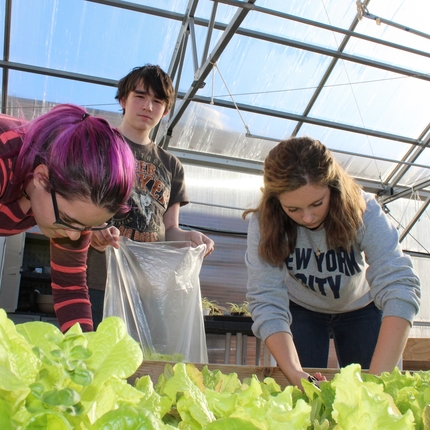By Deborah Van Fleet, Public News Service-Nebraska
Students in eight rural Nebraska schools will soon be getting hands-on experience in "specialty crop" production thanks to a two-year U.S. Department of Agriculture grant awarded to the Center for Rural Affairs.
Kirstin Bailey is senior project associate at the center and lead staff on the Nebraska Young Farmer Program: Introducing Specialty Crop Production. It is a collaboration with the Nebraska Department of Education's Farm to School program.
Bailey said "specialty crops" are non-commodity crops, including most vegetables, fruits, herbs, Christmas trees, cut flowers and honey. She pointed out the crops are well-suited for school ag programs.
"Specialty crops can be done on as small as a couple of raised beds," Bailey explained. "That's what's nice about it for schools, they might not need tons of acres to implement a new strategy."
Bailey noted each school will select a specialty crop and be matched up with an area farmer who will serve as a mentor, with both the farmer and the school receiving a stipend. In addition to a farm tour, students and teachers will receive training on budgeting and technical assistance from their farmer mentor, the Center and the Nebraska Department of Education.
Banner County and Bancroft-Rosalie schools are signed on so far, and applications will be accepted soon to add six more schools.
Bailey emphasized the project came about after a number of students approached the Center's staff with questions about beekeeping and other specialty crops at the state FFA convention.
"Because of their interest, we were able to put together this proposal and this project," Bailey recounted. "We're really looking forward to what we're going to learn from those kids and how this can help the schools introduce different forms of ag to these kids."
Sarah Smith, farm to school coordinator at the Nebraska Department of Education, said the project has the potential to have a huge effect on students.
"This has such a tie-in to actually involving the students in farm-to-school efforts, and growth in potential for careers in the future," Smith stressed.
She praised the number of farm-to-school elements it incorporates.
"They will have participation from the school nutrition programs where they'll have a stake in the food that is grown on site, but also connecting those students to the farms, and those farmers that are mentoring the school as well," Smith added.
Click here to listen to the interview.





